News
No sites, no drivers, no will to reform – the garbage problem mounts
Piles of garbage left uncollected for days on the roadside, smoky fumes from burning rubbish, vehicles being forced to drive over the roadside dumps – these are common sights in Colombo and its outskirts.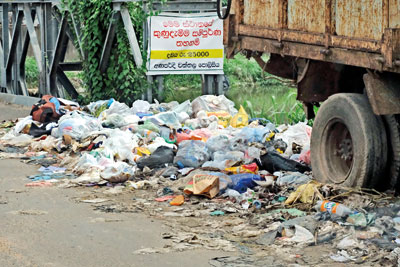
Waste disposal has been plagued by a string of problems including collection, eventual disposal, lack of equipment, shortage of staff and difficulties with garbage trucks.
Wattala, Kolonnawa, Maharagama, Mt Lavinia and Dehiwela are among the areas most affected by huge amounts of rubbish accumulating on roadsides.
There is garbage dumped on both sides of the roads in Alwis Town and Hekitta, with some of the heaps set on fire, emitting dark, stinking clouds of smoke.
A resident of Alwis Town, Victor Jayawardena, 68, complained that the garbage collectors only take degradable waste but not non-degradable waste including plastic.
He said that previously the Urban Council collectors took away rubbish daily, but since the laws on garbage segregation were introduced, they had not collected plastic bags and paper.
“The garbage issue is a nuisance. Look at our lane – garbage scattered everywhere, even the sides of the bridge and the canal have become dump sites,” he said.
Mr Jayawardena, a retired railways employee, said he is being forced to hang his degradable rubbish in bags on his gate and burn plastic bags on his property as garbage accumulated at his house.
Other residents, he said, burn their garbage out on the roadside, with the resulting ash and smoke affecting nearby residents and pedestrians.
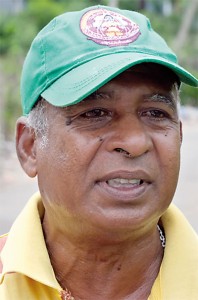
N A Premasiri
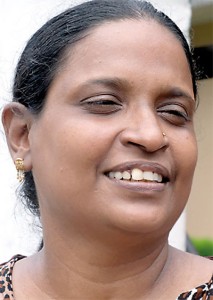
R Akila
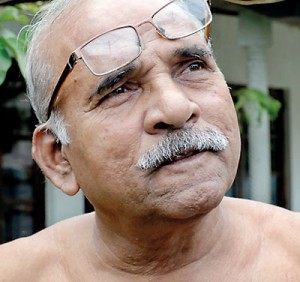
Victor Jayawardena
Another resident, R Akila, said she did not have space in her house to store uncollected dirty lunch sheets and plastic bags at home and was burning them.
The mother of two children, she was worried about the piles of garbage attracting flies, mosquitoes and mice into the house, with mosquitoes breeding in discarded plastic bags and wrappers.
“I worry about my parents and my two children who can easily fall sick due to mosquitoes and flies,” she said.
Trishaw driver R K Menan, 48, said he could not park his vehicle in some areas due to the unpleasant smell.
He said he sees area residents, as well as people from far-off areas, dumping garbage on Alwis Town roadsides and into the canal, which has not been cleaned by the Urban Council.
Labourer N A Premasiri, who lives in Mattakuliya, said garbage segregation caused difficulties for poor people.
He claimed people who carried their rubbish into his area in their vehicles, in order to dump it away from their own homes, were seldom caught by the police and, even when they were, escaped penalty by using contacts or offering bribes. Garbage was being dumped everywhere, including at schools and private education institutes.
“If waste is dumped near our house or in the drain, they will not take action against the people who dump it, but they fine us,” he said.
The Chairman of the Wattala-Mabole Urban Council, Mark Gunasekera, said non-degradable garbage was not being collected because there were too few employees to operate the garbage collection tractors.
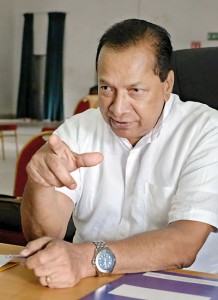
Mark Gunasekera
Mr. Gunasekera said two of the seven tractors available were not in use due to a lack of drivers and labourers.
He said on Monday, Tuesday and Friday workers collect degradable garbage and take it to Karadiyana to be turned into compost.
He said the council was negotiating with two foreign companies willing to construct a mechanised incinerator at an Urban Council garbage dump area.
“They told us that the machine can segregate and incinerate 100 tons of garbage daily and as a byproduct create fuel such as diesel,” he said.
The council was calling for tenders for the construction of such an incinerator.
Mr. Gunasekera said he had asked area police to carry out night raids to catch people who dump their rubbish on roadsides under cover of darkness.
An opposition member said that although the council seemed to have big plans, it appeared unable to find sufficient drivers to operate garbage tractors daily.
Maharagama Urban Council UNP Member Dhanushka Ramanayake said the vehicles used to collect waste were old and in need of constant repair.
He also claimed there were problems with contracts awarded to private garbage collectors with only one private contractor currently allowed to transport garbage to Karadiyana as other contracts had expired.
The Chairman of the Kolonnawa Urban Council, V S Guttila Silva said authorities there had nowhere to dump garbage as the council’s 22-acre site had been taken as the Western Province’s key garbage dump site.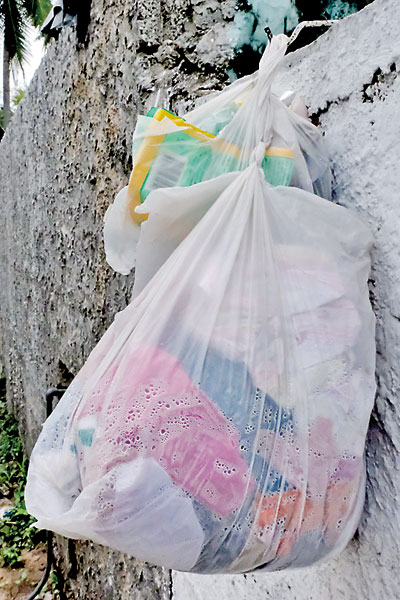
The site received 100 tons of garbage a day, causing a mountain of waste to collapse onto a residential area last year, killing at least 30 people.
He said the council paid Rs3,000 a ton to dispose garbage at Muthurajawela but that this was a huge expense as 16-20 tons of garbage had to be cleared every day.
“Garbage segregation adds to the problem as underprivileged people living in poor conditions are unable to sort and keep garbage at their premises, and we cannot take mixed garbage to Muthurajawela, and we don’t have the luxury of a sorting plant of our own as we lack land,” Mr Silva said.
As a result, he said, mixed garbage was dumped on Kolonnawa roads by residents and outsiders.
“If culprits are brought before the courts they escape easily saying the local authorities don’t collect or clean garbage,” Mr Silva said.
He said the council was currently dumping garbage at a private land in Orugodawatte as the government said it could not provide space at the Karadiyana site until October.
Similar problems facing local authorities can be seen in other Colombo suburbs and in the outskirts of the city.
Kosala Gunawardena, who worked in the waste management sector for 18-20 years and is now Forest Manager at the Department of Forestry and Environmental Science at the University of Sri Jayawardenapura said the attitude of the local councils should change as they had authority over garbage collection.
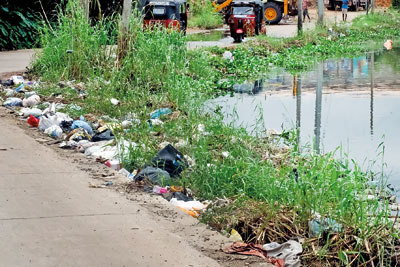
Big stench and unsightly: Dumped garbage on both sides of the road in Alwis Town and Hekitta Pix by Amila Gamage
“Local authorities should at least segregate degradable organic garbage from non-organic, non-degradable garbage in their collections,” he said.
He said degradable waste collection should be carried out daily, partly for the convenience of householders and also because closed bins caused garbage to degrade without oxygen and become less productive as organic fertiliser.
Payments to collectors should be reduced if they failed to take segregated garbage to dumping sites, Mr Gunawardena said.

